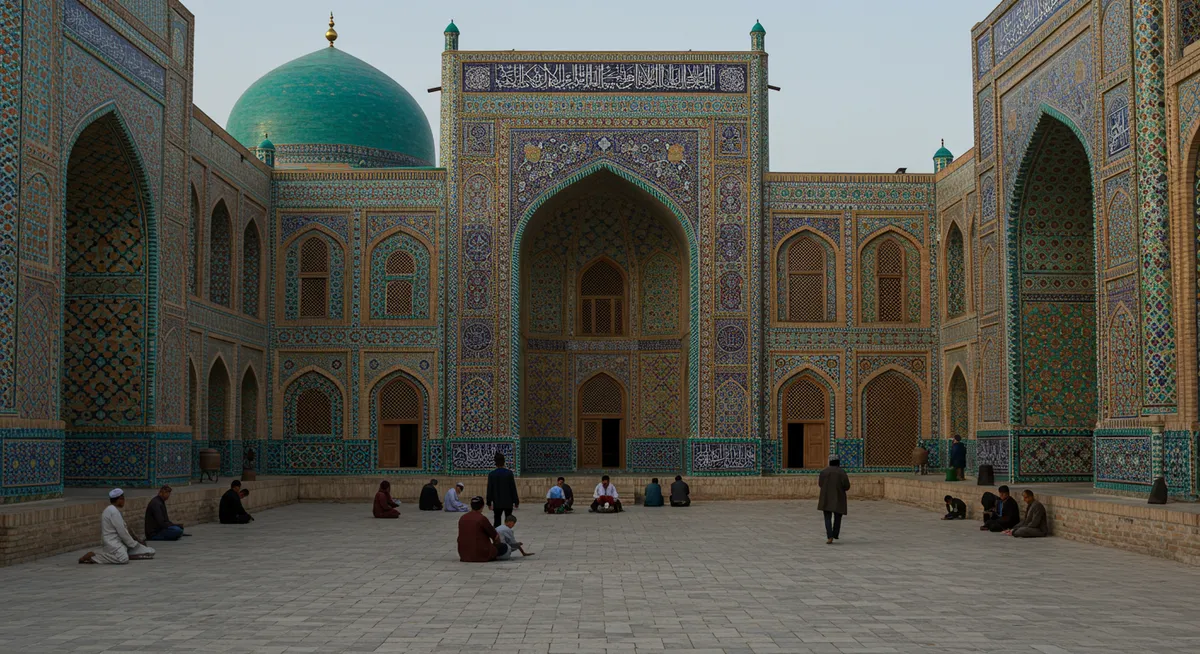
Sufi Pilgrimage Sites in Bukhara, Uzbekistan
Table of Contents
Want to find the best travel deals for this destination? Chat with our travel hacking specialist!
Get Travel HacksCategory: sufi-pilgrimage-sites-bukhara-unknown
Unveiling Bukhara's Sacred Sufi Pilgrimage Sites
Having explored Bukhara's ancient alleyways and vibrant bazaars extensively, I've always been drawn to the city's profound spiritual heritage. Bukhara, often called a 'Dome of Islam,' is a crucible of Sufi thought, particularly for the Naqshbandi order. This guide will illuminate the most significant Sufi pilgrimage sites Bukhara cherishes, offering insights into their history and spiritual importance. Prepare to embark on a journey that transcends mere sightseeing, connecting you with centuries of devout faith and mystical wisdom in Uzbekistan's heartland. Enhance your Bukhara experience with our Bukhara itinerary. Immerse yourself in local culture with our Bukhara cultural guide.
The Heart of Sufi Devotion: Bahauddin Naqshbandi Complex
Undoubtedly the most revered of the Sufi pilgrimage sites Bukhara boasts, the Bahauddin Naqshbandi Complex is the spiritual epicenter for followers of the Naqshbandi order. Located just outside the city, it houses the tomb of Muhammad Bahauddin Naqshband, the 14th-century founder of this influential Sufi tariqa. My first visit left me captivated by the serene courtyards, the intricate tilework of the mosque, and the palpable sense of peace. This isn't just a site; it's a living spiritual center where pilgrims perform rituals and seek blessings. Remember to dress modestly and approach with respect; it's a profound experience. Enhance your Bukhara experience with our Bukhara shopping guide. Plan your perfect trip with our Bukhara itinerary.
Tracing the Golden Chain: Other Key Sufi Shrines
Beyond the primary complex, Bukhara is dotted with other significant Sufi pilgrimage sites, integral to what's known as the 'Seven Saints' pilgrimage associated with the Naqshbandi lineage. These include the mausoleums of Khoja Arif ar-Revgari and Sayyid Amir Kulal, among others, each a link in the spiritual 'golden chain.' Visiting these sites offers a deeper understanding of the Sufi path's historical progression and philosophical evolution. For those eager to delve into lesser-known spiritual corners, explore Bukhara's hidden gems, often revealing small, unassuming shrines that hold immense spiritual weight. Discover insider secrets with our Bukhara hidden gems.
Understanding the Naqshbandi Path: Spiritual Insights
The Naqshbandi Sufi order, centered around the Sufi pilgrimage sites Bukhara offers, emphasizes inner spiritual development and silent dhikr (remembrance of God). Unlike some other orders, the Naqshbandiyya encouraged its followers to remain in society, engaging in trade and family life while pursuing spiritual growth. This practical approach made it widely accessible and influential. As you wander through these sacred spaces, consider the wisdom encapsulated in their teachings: 'Journey Home,' meaning to turn within oneself, seeking divine presence there. It’s a powerful reminder to reflect, even amidst travel.
Planning Your Spiritual Journey to Bukhara
When planning your visit to Bukhara's Sufi pilgrimage sites, timing is key. Early mornings or late afternoons offer a more tranquil experience, avoiding larger tour groups. Engage with local guides if possible; their insights enrich the experience immeasurably. While at these sacred sites, consider experiencing some unusual things to do in Bukhara, such as visiting traditional teahouses near the complexes for quiet contemplation or exploring nearby artisan workshops. Always remember proper etiquette: dress modestly, remove shoes when entering mosques or shrines, and maintain a respectful demeanor throughout your spiritual exploration.
Frequently Asked Questions
What is the most important Sufi site in Bukhara?
Can non-Muslims visit Sufi pilgrimage sites in Bukhara?
What is the 'Seven Saints' pilgrimage?
Bukhara truly stands as a beacon for Sufi thought, with its pilgrimage sites offering a profound glimpse into a rich spiritual heritage. Visiting these Sufi pilgrimage sites Bukhara cradles is more than just a historical tour; it’s an invitation to connect with centuries of mystical wisdom and devotion. From the awe-inspiring Bahauddin Naqshbandi Complex to the tranquil shrines dotting the landscape, each location tells a story of faith, perseverance, and enlightenment. Consider this spiritual journey on your next trip to Uzbekistan, and perhaps discover a deeper meaning in your travels.